ARTICLE AD BOX
Hugo Bachega
Reporting fromSouthern Lebanon

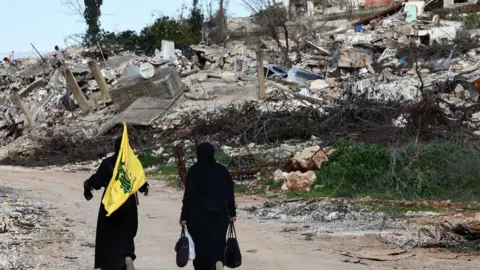 Reuters
Reuters
Kfar Kila is one of the border towns in Lebanon that were almost completely destroyed by the Israeli military during last year's war
Last year, on 17 September, at around 15:30, a pager which a nurse called Adam was given at the start of his shift at a hospital in Lebanon received a message. The devices had been distributed by Hezbollah, the Shia Muslim group, to thousands of its members, including Adam, and he said it was how he and his colleagues expected to be alerted of emergencies or a disaster.
"The pager started beeping non-stop and, on the screen, it said 'alert'," Adam, who did not want to use his real name for safety reasons, said. The text appeared to have been sent by the group's leadership. To read it, he had to press two buttons, simultaneously, with both hands. Adam did it many times, but the beeps continued. "Then suddenly, as I was sitting at my desk," he said, "the pager exploded".
On his phone, Adam showed me a video of the room, filmed by a colleague minutes after he was rescued. There was a trail of blood on the floor. "I tried to crawl to the door because I had locked it while I changed my clothes," he said. The blast had opened a hole in the wood desk. I noticed a beige-like object. "That's my finger," he said.
Hezbollah is known for being a powerful militia and is proscribed as a terrorist organisation by countries including the UK and the US. But in Lebanon, it is also a significant political movement with representation in parliament and a social organisation. Here, being a Hezbollah member does not necessarily mean you are a fighter. In fact, many are not. Adam told me he had never been one. People can work in the group's large array of institutions that include hospitals and emergency services, for example.
Hezbollah had decided to equip members with low-tech pagers for communicating rather than smartphones which it feared could be used by Israel, its arch-enemy, to gather sensitive information about the group. It turned out, though, that the devices which Hezbollah had distributed were part of a years-long elaborate Israeli plan: an explosive compound had been concealed within the pagers, waiting to be activated – and that is what happened on that day.

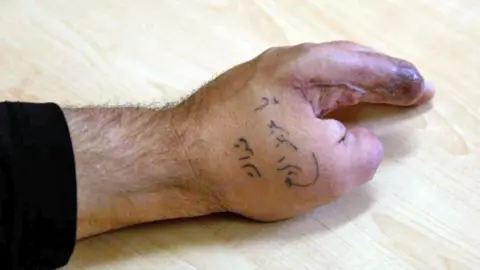 Supplied
Supplied
Adam's maimed hand bore a tattooed message which expressed that his wounds were a cheap sacrifice in honour of Hassan Nasrallah, the late Hezbollah leader
In the attack, Adam, who is 38, lost his thumb and two fingers on his left hand, and part of a finger on the other. He was blinded in his right eye, which has been replaced with a glass eye, and has only partial sight in the other. He showed me a picture of him in a hospital bed, taken an hour after the explosion, with his face burned, entirely blooded, covered with bandages. Despite his wounds, Adam remained committed to Hezbollah. I asked him how he felt when he looked at himself like that. "Very good," he said in English. Then, in Arabic, he told me: "Because we believe that the wounds are a kind of medal from God. Honouring what we go through fighting a righteous cause."
But the group is no longer the force it was since being dealt a devastating blow in Israel's bombing campaign and invasion of Lebanon, which followed the pager attacks, and faces serious challenges. At home, there is discontent among some supporters over the lack of funds for reconstruction, while the new government has vowed to disarm the group. In neighbouring Syria, the ouster of Bashar al-Assad's regime has disrupted the route used by Iran, its main supporter, for the supply of weapons and money.
I visited communities in southern Lebanon that were destroyed by Israel's attacks, and saw that support for Hezbollah appeared undimmed. But, in views rarely expressed to media, others who backed it said the war had been a mistake, and even questioned the group's future as a military force.

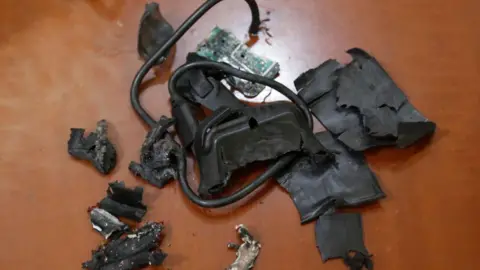 AFP
AFP
Israel rigged thousands of pagers with explosives and detonated them remotely on 17 September
You can listen to more from Hugo in his radio documentary - Crossing Continents: Hezbollah in trouble - here
Hezbollah, or Party of God, was created in the 1980s in response to Israel's occupation of Lebanon during the Lebanese civil war. To this day, the destruction of Israel remains one of its official goals. Their last war had been in 2006, which was followed by years of relative calm. Violence flared up again in 2023 after Hamas attacked Israel on 7 October, killing about 1,200 people and taking more than 250 hostages. When Israel started bombarding Gaza, Hezbollah began firing rockets in around northern Israel, saying it was acting in support of Palestinians. Israel responded with air strikes on southern Lebanon, and tens of thousands of people were forced to flee on both sides of the border.
The pager attacks were a turning point in what had been, until then, an intensifying but relatively contained conflict. The devices exploded as people were working, shopping or at home. About a dozen people, including two children, were killed, and thousands wounded, many of them maimed. The attack caused anger in Lebanon, because of what was seen as its indiscriminate nature. A day later, walkie-talkies used by the group suddenly exploded too. I was at a funeral of some of the victims of the pagers when there was a loud blast. Hezbollah members, desperate, asked us to turn off our cameras or phones, as no-one knew what else could explode.
In the following weeks, Israel carried out a relentless bombing campaign and a ground invasion of southern Lebanon. Across the country, around 4,000 people were killed and almost 18,000 others wounded. For Hezbollah, the conflict proved to be catastrophic. The group's top leaders were assassinated, many of its fighters killed and much of its arsenal destroyed. Among the dead was Hassan Nasrallah, who had been the head of Hezbollah for more than 30 years, assassinated in a massive air strike on the group's secret headquarters under apartment blocks in the Dahieh, where Hezbollah is based in Beirut.
At the end of November, battered, the group agreed on a ceasefire that was essentially a surrender.

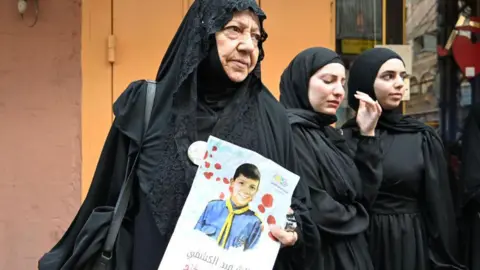 Getty Images
Getty Images
Two children were among the dozens of people killed in the surprise pager and walkie-talkie attacks - a turning point in the Israel-Hezbollah conflict
Southern Lebanon is the heartland of Lebanon's Shia Muslim community, which is the bulk of Hezbollah's support base, and one of the regions of the country where the group has traditionally had a significant presence. I travelled to the border town of Kfar Kila, which had a pre-war population of 15,000 and was one of the first to fall when Israel invaded. Israel's stated war goal was to allow the return of residents to its northern communities, which had been emptied because of Hezbollah's attacks. In Kfar Kila, there was almost nothing left standing, and yellow Hezbollah flags dotted the huge piles of broken concrete and twisted metal.
A 37-year-old woman called Alia had come with her husband and three daughters, aged 18, 14 and 10. The youngest was wearing a badge with a smiley picture of Nasrallah. "I only knew that this was my house because of the remains of this plant over there, the roses, and this tree," Alia told me. From the street, she pointed at what she could identify in the rubble. "This is the couch. There, the curtains. That was the living room. And that was the bedroom. That's my daughter's bicycle," she said. "There's nothing to recover".

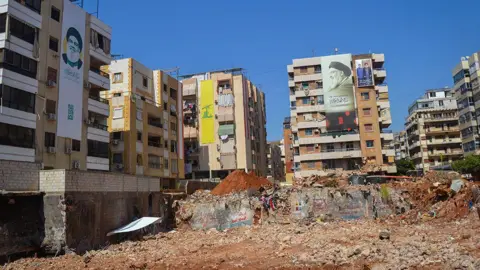
Many of Hezbollah's top leaders, including its long-time chief Hassan Nasrallah, were killed in air strikes in Beirut's southern suburbs
According to the World Bank, costs related to reconstruction and recovery are estimated at $11bn (£8.5bn) across the country. One of Hezbollah's immediate challenges is to give financial help to people affected by the war, which is crucial to keep supporters on board. Those who lost their houses have received $12,000 to cover for a year's rent. But the group has not promised money to rebuild what was destroyed or to give compensation for destroyed businesses. The limited support is already fuelling discontent. Aila's shop had stock worth $20,000, and she was concerned no-one would cover her losses.
Iran, Hezbollah's backer, is one of the group's main sources of funds, weapons and training. But Lebanon's international allies want to cut off any financial support from Iran, to put even more pressure on Hezbollah, and say there will be no help if the Lebanese government does not act against Hezbollah. With the group weakened militarily, critics see this as a unique opportunity to disarm it.
Alia told me: "We don't want any aid that comes with conditions about our arms... We won't allow them to take our dignity, our honour, take away our arms just for us to build a house. We'll build it ourselves."

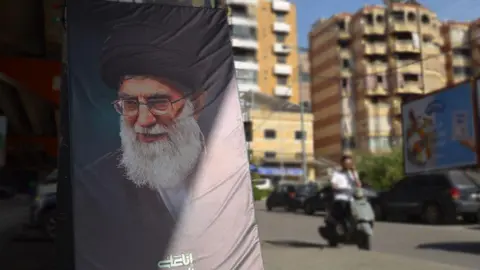
Iran's Supreme Leader, Ayatollah Ali Khamenei, is seen on posters in Beirut. Iran is Hezbollah's main backer and is likely to decide the group's future.
It is not surprising that Hezbollah's supporters remain defiant. For many, the group is a fundamental part of their lives, essential in their identities. But Hezbollah's power is seen - and felt - beyond its base. Before the war, its military wing was considered to be stronger than the Lebanese national army. A solid parliamentary bloc means that virtually no major decision has been possible without Hezbollah's consent. Because of Lebanon's fractured political system, the group has representation in the government. In short, Hezbollah has had the ability to paralyse the state, and many times has done so.
But the war has diminished the group's domestic position too. In January, the Lebanese parliament elected a new president, former army chief Joseph Aoun, after a two-year impasse that critics had blamed on Hezbollah. In the past, its MPs and allies would walk out of the chamber when a vote was scheduled. But Hezbollah, severely wounded and with its communities in need of help, felt it could no longer block the process, which was seen as vital to unlock some international support. In his inauguration speech, Aoun promised to make the Lebanese army the sole carrier of weapons in the country. He did not mention Hezbollah, but everyone understood the message.
Ultimately, Hezbollah's future may lie with Iran. One of the reasons for Iran to have a strong Hezbollah in Lebanon was to deter any Israeli attack, especially on its nuclear facilities. This is now gone. Other groups backed by Iran in the region, part of what it calls the Axis of Resistance, have also been significantly weakened, including Hamas in Gaza and the Houthis in Yemen. And the fall of the Assad regime in Syria has interrupted Iran's land corridor to Lebanon - and Hezbollah. Even if Iran decides to rearm Hezbollah, it will not be easy.

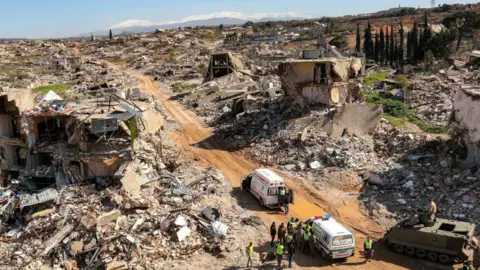 AFP
AFP
Israeli forces withdrew from Kfar Kila in February as part of a ceasefire deal between Israel and Lebanon
Nasrallah has been succeeded by Naim Qassem, his former deputy, who is not seen as charismatic or influential. From time to time, rumours emerge of internal disagreements. And whispers of dissent among the rank and file are spreading. In southern Lebanon, I met a businessman who did not want to have his name published, fearing that he could become a target on social media. On the wall of his office, he had pictures of Hezbollah's leaders. Now, he was critical of the group.
"The mistakes have been huge," he said. "Hezbollah decided to engage in a war to support Gaza without proper calculations, without consulting the people or the Lebanese state". (To date, Israel's war in Gaza has killed more than 50,000 Palestinians, according to the Hamas-run health ministry.) He told me a lot of supporters shared his view. "If Hezbollah don't do a proper reassessment of the situation... they will destroy themselves and harm us along the way. We brought this destruction on ourselves, and we're now suffering".
As part of the ceasefire deal, Hezbollah agreed to remove its weapons and fighters from southern Lebanon, and a Western diplomatic official told me the group had largely done it. Israel was required to withdraw its troops, but has remained in five positions, saying this is needed for the safety of its border communities. The Israeli military has also carried out air strikes on targets and people it says are linked to Hezbollah. Lebanon says the Israeli permanence in Lebanese territory and its attacks are violations of the deal.
Discussions about Hezbollah's disarmament are likely to be difficult and long. A source familiar with the group told me one of the options was for Hezbollah's arsenal, believed to still include long-range missiles, to be put under the control of the state, while its fighters, estimated to be several thousand, could be integrated into the Lebanese army.
The businessman told me: "A lot of the families, especially those of wounded and martyred fighters, are totally dependent on Hezbollah. These people won't disengage from Hezbollah immediately… Without a plan, it would be a recipe for internal conflict. It would drive Lebanese to fight against each other".
For weeks, I tried to interview a representative from Hezbollah, but no-one was made available.

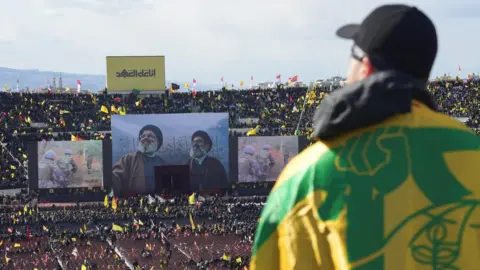 Reuters
Reuters
Tens of thousands of people attended a funeral service for Hassan Nasrallah and Hashem Safieddine, another top Hezbollah leader, at a stadium in Beirut
Adam, the pager casualty, has now returned to his work as a nurse. He no longer does nightshifts, however, as he cannot see well. The explosion also left shrapnel in head and chest. As he gets tired easily, he needs to take constant breaks to rest. Physiotherapy sessions are helping him adapt to using what is left of his left thumb and middle finger.
Prominent in his living room, is a picture he framed, of himself, with his injured hands, holding a pager. He shared with me another picture, of his maimed hand, only now it also bore a tattooed message which expressed that his wounds were a cheap sacrifice in honour of Nasrallah, the late Hezbollah leader. He, like many, still believes in the group's purpose, and the role it plays.

 2 months ago
31
2 months ago
31

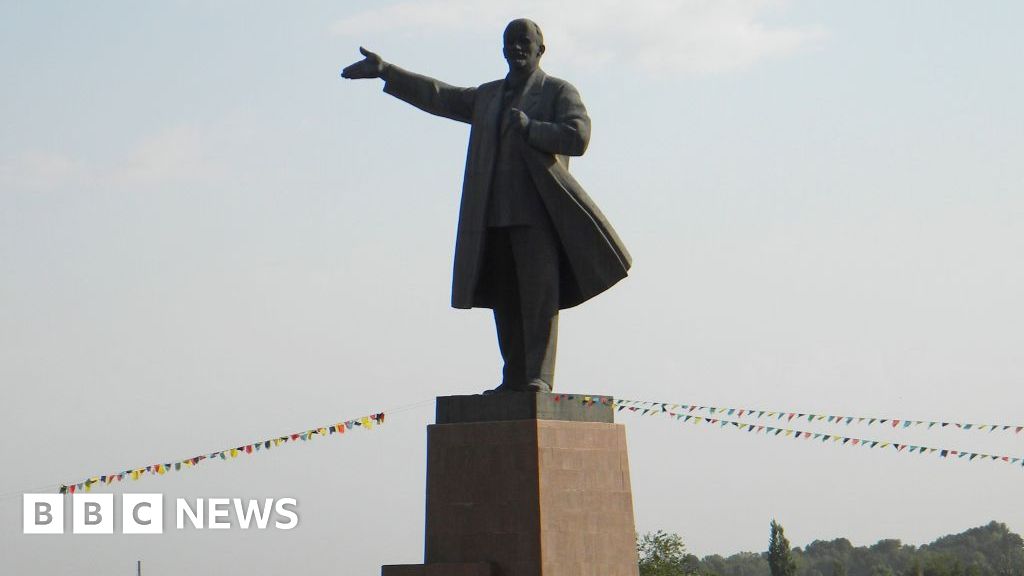






 English (US) ·
English (US) ·